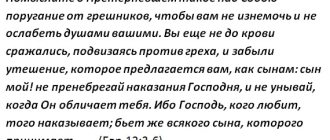Part 3. Fighting thoughts
Cutting off bad thoughts is a necessary condition for the fight against passions.
Passion is not born in a person’s soul right away. The Holy Fathers say that it begins with an adjective, or an adversary
.
In Slavic, to be struck
means to collide with something.
The pretext arises in a person’s mind from the impressions of what he saw, for some other reason, or as an image imposed by the enemy - the devil. But the excuse comes against the will of a person, without his consent and participation. A person himself is free to accept the pretext in his heart or reject it. If the pretext is accepted, it is already thought about and made its own. Fathers also call it a combination
or an interview with thoughts.
The third stage is inclination to thought
, or
compunction
, when the will has so fallen under the influence of a sinful thought, has become so close to it that a person is ready to move on to action. The sin is already half committed in thoughts. As the Lord says in the Gospel: “From the heart come evil thoughts, murder, adultery, fornication, theft, false witness, blasphemy” (Matthew 15:19), thus showing where sin begins - “with an evil thought” about it. And the Apostle James writes: “But lust, having conceived, gives birth to sin, and committed sin gives birth to death” (James 1: 15).
A sinful thought that has settled in the soul and heart will definitely someday turn into action. A person who allows himself immodest glances, who does not protect his sight and hearing from seductive pictures, who has unclean, lewd thoughts in his mind, cannot remain chaste.
“Can anyone take fire into his bosom so that his dress does not burn out? Can anyone walk on burning coals without having their feet burned?” - asks the wise Solomon (Proverbs 6: 27-28).
Therefore, those who want to lead a spiritual life should remember that evil thoughts must be killed in the bud, “breaking their babies against a stone” (see: Ps. 136: 9). And the germ of a thought is (as already said above) a pretext
- something that does not belong to us at all, but, like some malicious insect, trying to fly into the slightly open window of our consciousness.
I once read in a book on psychology that our thoughts are not at all “our property” and the creation of our mind. What we think is the result of many reasons and circumstances: upbringing, living conditions, the time in which we live, the country in which we were born, etc. For example, if we were born in a different country, at a different time, or had a different upbringing, we would think differently. Thus, what we think is not exactly our thoughts; they can arise for us for many reasons beyond our control. (It should also be added that Orthodox people know well that bad, sinful thoughts can come from one more source, and this source is well known.) Of course, these comments about thoughts concern only thoughts that have not taken root in the consciousness; if a person accepts a thought and begins to think about it, he already becomes close to it, it becomes his own.
Psychologists advise separating bad thoughts from good ones and filing a “divorce” with the bad ones, that is, not letting them into your consciousness, not considering them yours, but, on the contrary, “wooing” good thoughts and making friends with them in every possible way, replacing the bad, gloomy, aggressive ones. thoughts are bright, kind, positive. I liked this idea very much, but how surprised I was when I read very similar advice from St. Theophan the Recluse: “It is a great mistake, and a universal mistake, to consider everything that arises in us as blood property, for which we must stand as if for ourselves. Everything sinful has come to us, therefore it must always be separated from ourselves, otherwise we will have a traitor within ourselves. Whoever wants to fight with himself must divide himself into himself and the enemy hidden within him. Having separated from yourself a certain vicious movement and recognized it as an enemy, then convey this consciousness and feeling, revive hostility towards it in your heart. This is the most salutary means of driving away sin. Every sinful movement is retained in the soul through a feeling of some kind of pleasantness
From him; therefore, when hostility towards him is aroused, it, deprived of all support, disappears by itself.”
Indeed, sin and defilement cannot be part of the soul, they are not characteristic, not akin to man; we were created pure, bright, purified by the waters of holy baptism. Here lies a child, just baptized; he is pure, he is like an angel of God, and “everything sinful has come to us,” it comes only later. And only by accepting it into ourselves, agreeing with it, do we ourselves settle sin in our soul. And then it’s oh so difficult to kick him out.
Shield of Faith
We must install a kind of filter in our consciousness, decide which thoughts are desirable for us, and which cannot be allowed to be fired by a cannon. Act like parents who can block children’s access to certain websites or television channels. Another analogy can be given. When the doorbell rings, we don’t immediately open it without asking: “Who’s there?”? No, we first look through the peephole and only after making sure that it is a person we know is calling, do we let him into the apartment.
You don’t need to be afraid of thoughts, but you don’t need to talk to them either.
I once confessed to an experienced priest that I was tormented by sinful thoughts, and he gave me the following advice: “Perceive thoughts as something external that has nothing to do with you. Thought can control the thoughts that come to us, but it is in our will whether to accept it or not.” Let's say a person is sitting in a house; windows and doors are closed; there is a storm, a blizzard, bad weather outside the windows, but they do not harm him until he opens the window. But as soon as you open it, the bad weather will rush inside, and it will become uncomfortable and cold. The same is true for thoughts: they are inevitable, but they should not enter the soul and defile it.
It is very important not only to get rid of sinful thoughts and not allow them into your soul, but also to fill it with other thoughts - spiritual, bright, kind. After all, there is a law: nature does not tolerate emptiness. And spiritual nature too. Remember the parable of how an unclean spirit comes out of a person and, driven out, walks through deserted places, then returns and, finding its place unoccupied, brings seven of its worst demons. A holy place, as they say, is never empty.
Saint Theophan advises, after expelling evil thoughts, to place a kind of shield at the very entrance to the soul and not let them back in: “And for this purpose, hasten to restore in the soul beliefs opposite to those on which the disturbing thought is based.”
We have already said that to every passion there is an opposite virtue. Likewise, every sinful thought can be contrasted with an opposing, virtuous one. For example, a prodigal – chaste, pure; angry - benevolent; the thought of condemnation - the thought of justification, pity for one's neighbor, etc.
In conclusion, I will give one more piece of advice from Saint Theophan: to begin the fight against thoughts with prayer to the Lord, the saints and the Guardian Angel. So that we attribute the successes of spiritual warfare not to our own efforts, but only to the help of God.
You need to find your main passion and fight it both actively and in thoughts. This fight will never stop. “But it’s getting easier and easier... or it will become more and more convenient to overcome it. And experience will increase; so it won’t be difficult to notice and reflect.”
(To be continued.)
Psychiatrists call blasphemous thoughts obsessions and treat them with antidepressants
Study of human higher nervous activity I.P.
Pavlov made it possible to reveal the mechanism of the appearance of obsessive thoughts in a person. Psychiatry developed its own idea about blasphemous thoughts and gave its answer to the question of how to deal with bad thoughts. With the development of psychiatry as a science, more and more states of the human soul have been explained. Concepts such as neuroses, neurasthenia, and depression appeared. The obsessive thoughts that accompany such conditions are called obsessions (lat. obsession - siege). At the beginning of the 20th century, a separate obsessive-compulsive disorder (OCD) was identified in psychiatry.
The book Obsessive-Compulsive Disorder: Causes, Development, and Treatment, edited by Caleb W. Lack, defines OCD:
For psychiatrists, it makes no difference what kind of obsessive thoughts pop into a person’s head: aggression, blasphemy, fear - from a medical point of view, they are all the same.
To get rid of obsessive thoughts, patients are prescribed psychotherapy. It allows a person to get rid of psychological problems. If things go too far, antidepressants are prescribed.
For a believer, it is necessary to identify spiritual and mental disorder in time.
If the disorder is spiritual, then the best way to get rid of blasphemous thoughts is repentance, confession and prayer.
If it’s mental, then it’s better to see a doctor. God deprives people of reason as punishment, but He also lends a helping hand in the form of doctors. There is no point in avoiding their help.
Pray, work, be submissive to the Lord and blasphemous thoughts will never visit you!
By leaving a comment, you accept the user agreement
Psychologist's advice
Psychologists advise writing your worries down on paper. Write down in a column all the bad things that have happened to you lately.
The list may include events that happened years ago. Write down if they bother you.
Make notes next to the problems: rate on a scale of ten how much they concern you.
Now start with the minor ones: think about it, find a solution. Move on to topics of concern, analyze the situation, and evaluate possible outcomes.
This method will help you understand yourself and understand what is bothering you. Get your head in order. Bad thoughts, like worms, start where there is dirt.
Do some spring cleaning in your thoughts and your fears will have nowhere to hide. Psychologists do the same thing in their sessions - they help clients bring order to their thoughts.
Useful video
https://youtube.com/watch?v=Jc4AINyOBhI
Prayer to help
We must not forget about protective prayer
To calm down during a panic attack, you need to read the following prayer:
You can also read the following prayer of protection:
Cross yourself three times. It is recommended to read this prayer every day before going to bed. In just a few weeks you will see the first results - your mind will become clearer, bad thoughts will go away.
To overcome phobias
The ritual for phobias is carried out at first rays of sun
In order to get rid of various phobias, you need to wake up with the first rays of the sun and say the prayer three times:
You can read protective words for several days in a row until you see the result.
For all rituals and prayers to bring the desired result, you must believe in their power. But at the same time, if various psychological, nervous or mental disorders appear, you should not rely only on the help of magic. It is imperative to seek help from qualified specialists and undergo prescribed medication treatment. If obsessive thoughts appear, consultation with a psychologist or psychotherapist is mandatory. Only after long-term work on yourself will you be able to direct your life in the right direction, get rid of anxieties, fears and other phobias.
Psychiatrists call blasphemous thoughts obsessions and treat them with antidepressants
Study of human higher nervous activity I.P. Pavlov made it possible to reveal the mechanism of the appearance of obsessive thoughts in humans.
Psychiatry has developed its own idea of blasphemous thoughts and given its answer to the question of how to deal with bad thoughts. With the development of psychiatry as a science, more and more states of the human soul have been explained. Concepts such as neuroses, neurasthenia, and depression appeared. The obsessive thoughts that accompany such states are called obsessions (lat. obsession - siege)
At the beginning of the 20th century, a separate obsessive-compulsive disorder (OCD) was identified in psychiatry.
The book Obsessive-Compulsive Disorder: Causes, Development, and Treatment, edited by Caleb W. Lack, defines OCD:
For psychiatrists, it makes no difference what kind of obsessive thoughts pop into a person’s head: aggression, blasphemy, fear - from a medical point of view, they are all the same.
To get rid of obsessive thoughts, patients are prescribed psychotherapy. It allows a person to get rid of psychological problems. If things go too far, antidepressants are prescribed.
For a believer, it is necessary to identify spiritual and mental disorder in time.
If the disorder is spiritual, then the best way to get rid of blasphemous thoughts is repentance, confession and prayer.
If it’s mental, then it’s better to see a doctor. God deprives people of reason as punishment, but He also lends a helping hand in the form of doctors. There is no point in avoiding their help.
Pray, work, be submissive to the Lord and blasphemous thoughts will never visit you!









